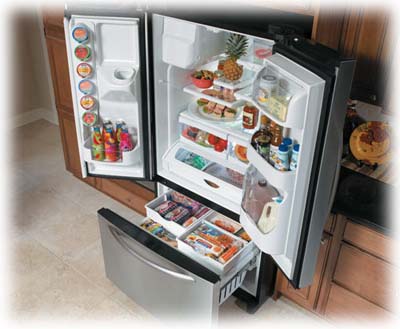Understanding Energy Efficiency Standards For Refrigerators and Other Appliances
If you prefer to listen rather than read this article, here’s the audio version:
Refrigerators are widely used home appliances that consume much electricity as they work round the clock.
This makes them account for approximately 10 to 20 percent of your total home electricity usage.
Therefore, buying an energy efficient refrigerator is a smart investment if you are looking to save money on utility bills in the long run.
So, to better understand the whole thing, here are the Energy Star Certification and CEE Tier Ratings and their benefits explained.
What is Energy Star Certification?

Refrigerators and other home appliances that have an Energy Star label are well known for their efficient energy use. Did you know that by buying energy star refrigerators you can reduce your utility costs to a great extent? Yes, using appliances that consume less electricity can help you save hundreds of dollars every year.
Energy Star Fridges are designed to save energy without sacrificing on capacity, excellent food preservation and other features. On average, appliances with Energy Star Certification can save 20% to 30% energy and are 15% more efficient compared to non-Energy Star certified appliances.
However, the energy consumption on Energy Star certified refrigerators vary from one model to another. Therefore, when looking for a new fridge, always compare different models to find the one that meets all your needs and is the most efficient.
What About CEE Tier Ratings?

CEE Tiers are generated by the Consortium for Energy Efficiency to leverage the energy efficiency information related to appliances that have managed to earn Energy Star ratings. Like the Energy Star Certification, a CEE rating means your fridge is energy efficient and Eco-friendly.
There are basically 3 tiers for CEE ratings (Tier I, Tier II and Tier III). The CEE Tier I refrigerators are 20 percent more energy efficient and the CEE Tier II are 25 percent more efficient.
CEE Tier III energy rated refrigerators will typically use 30 percent less electricity. However, these refrigerators are a bit more expensive. If you are thinking long term though you are saving money. So, if you pay more on a new fridge now are spending less considering the entire lifespan of the appliance.
Additionally, note that the CEE rating uses the Energy Star label coupled with the Modified Energy Factor (MEF) and the Water Factor (WF) to assess energy efficiency.
So while an Energy Star refrigerator or any other appliance is known to be energy efficient, for the best water and electricity efficiency, make sure you consider the CEE Tier.
Benefits of Using Energy Efficient Appliances
- You save on your utility bills.
- Earns you energy tax credits.
- Improves quality of life because energy efficient refrigerators are more convenient and require less maintenance.
- Saves you up to 30% electricity costs.
- Reduces your carbon foot-print to a great extent.
The best energy efficient refrigerators
The energy star rating for refrigerators is a great way to pick a fridge that will run on a budget. We recommend checking out our best fridge for a home bar and best fridges for apartments, these include some small fridges.
Does Maintenance and care make a fridge more energy efficient?
Want to save money on your energy bill? Regular maintenance of your refrigerator is the key. A dirty coil can cause the refrigerator to work harder and use more energy.
So, make sure to clean the coils at least once a year. Defrosting the freezer is another important task that can improve the energy efficiency of your refrigerator. Frost build-up can reduce the efficiency of the freezer and make it harder to find what you need.
So, be sure to defrost the freezer at least once a year, or when the frost is more than 1/4 inch thick. By doing these simple tasks, you can ensure that your refrigerator runs at peak performance, saving you money on your energy bill in the long run.
Maintenance and care
Don’t let your refrigerator break down on you! Regular maintenance is key to keeping it running efficiently and prolonging its life.
One important task is cleaning the coils. Dust and debris can build up on the coils, making the refrigerator work harder and use more energy. So, make sure to clean the coils at least once a year. Another important task is defrosting the freezer.
Frost build-up can reduce the efficiency of the freezer and make it harder to find what you need. So, be sure to defrost the freezer at least once a year, or when the frost is more than 1/4 inch thick. Lastly, check for leaks in the seal.
A broken seal can cause the refrigerator to work harder and use more energy. So, check the seal around the door for any cracks or gaps, and replace it if necessary. With these simple maintenance tasks, your refrigerator will run like new for years to come.
Bottom Line
If you are looking to buy a new refrigerator, ensure you buy one that meets both the State and federal minimum energy efficiency standards.





